N. Mladenov: There is a Chinese wall between EU and NATO
Ralitsa Kovacheva, November 30, 2010
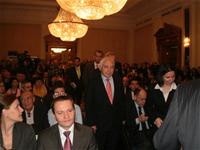 Imagine the same people, the same ministers from plus/minus a couple of states to sit in two different formats and behave as if between the one format and the other there is a Chinese wall.
Imagine the same people, the same ministers from plus/minus a couple of states to sit in two different formats and behave as if between the one format and the other there is a Chinese wall.
With this figure of speech Minister for Foreign Affairs Nickolay Mladenov described the relations between the European Union and NATO. The Minister held a public lecture on the topic NATO After Lisbon: The New Tendencies In The New Concept, upon invitation of the Atlantic Club in Bulgaria.
Unexpectedly even for the organisers, the interest for the lecture was so big that 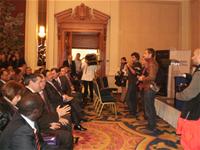 up to the last moment additional chairs were being brought into the hall. It turned out to be small for the diplomats, the army representatives, the politicians, the media and all the citizens who came to hear the Minister’s review about the NATO summit in Lisbon.
up to the last moment additional chairs were being brought into the hall. It turned out to be small for the diplomats, the army representatives, the politicians, the media and all the citizens who came to hear the Minister’s review about the NATO summit in Lisbon.
The relations between EU and NATO were one of the main topics in Minister Mladenov’s speech. He qualified the topic as “a very painful one”: “It turns out that it is easier to define the priorities of our strategic partnership with Russia than to achieve the level of co-operation between NATO and EU that we need. In the future, this will be one of the toughest challenges for the Alliance.” The problem is not just political or intellectual but has perfectly tangible dimensions, Minister Mladenov explained and gave an example with the EU mission in Bosnia and Herzegovina where the biggest contingent is the Turkish one. “At the same time, Turkey cannot participate in the commanding of this operation because NATO and the EU have no agreement for exchange of classified information”, Mr Mladenov pointed out.
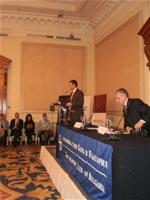 “When the EU sends its troops to Afghanistan the NATO forces cannot protect them because the EU and NATO do not have the agreement needed to make this possible. When NATO develops new technologies to protect its soldiers from makeshift explosive devices, it cannot share them with the EU and the EU has to develop its own protection means. Thus they both spend money for the same thing.”
“When the EU sends its troops to Afghanistan the NATO forces cannot protect them because the EU and NATO do not have the agreement needed to make this possible. When NATO develops new technologies to protect its soldiers from makeshift explosive devices, it cannot share them with the EU and the EU has to develop its own protection means. Thus they both spend money for the same thing.”
Asked by a journalist how disturbing the situation exactly was Minister Mladenov joked: “It is not that disturbing as to ravish our night’s sleep.” But he added that the problem lied mainly in the duplication of expenses for things that could be done jointly.
The problem is recognised in NATO’s New Strategic Concept adopted in Lisbon. There, the EU is defined as “a unique and essential partner to NATO”. The Alliance admits the importance of a stronger and more capable European defence and in this sense “welcomes the entry into force of the Lisbon Treaty which provides the framework for strengthening the EU’s capacities to address common security challenges.” NATO and the EU can and should play complementary and mutually reinforcing roles in supporting international peace and security, the document further states.
Persistently asked by the audience if Turkey was in the roots of the problem 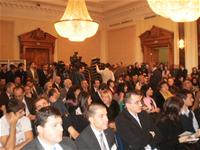 between the EU and NATO Minister Mladenov replied: “Turkey is the country which most fervently supports the idea that we have to overcome the problems in the co-operation between NATO and the EU – and it does so with arguments that are extremely reasonable and realistic. Turkey’s wish to join the European Defence Agency is understandable, Turkey’s wish to participate together with the EU in commanding joint military operations is logical. The problem is not that Turkey is mistrusted because there is no such mistrust. Turkey is a loyal NATO member. The problem is political and linked with other unresolved disputes in some EU member states which have to find their solutions as soon as possible.”
between the EU and NATO Minister Mladenov replied: “Turkey is the country which most fervently supports the idea that we have to overcome the problems in the co-operation between NATO and the EU – and it does so with arguments that are extremely reasonable and realistic. Turkey’s wish to join the European Defence Agency is understandable, Turkey’s wish to participate together with the EU in commanding joint military operations is logical. The problem is not that Turkey is mistrusted because there is no such mistrust. Turkey is a loyal NATO member. The problem is political and linked with other unresolved disputes in some EU member states which have to find their solutions as soon as possible.”
According to a source of the European online edition EUobserver, the discussions on the text referring to the relations with the EU in NATO’s Strategic concept was impeded exactly because of Turkey. The negotiations on the brief paragraph lasted three days and prolonged the official dinner of NATO leaders on 19 November. In the final version of the document, after the statement about the common challenges, it is said explicitly that “Non-EU allies make a significant contribution to these efforts.” In the text there are further statements that obviously have been added upon Ankara’s insistence.
The stalemate between Turkey and the EU rests mainly with the Cyprus issue. But not only. Turkey insists on being accepted as a member of the European Defence Agency (EDA) and to be consulted in the framework of the Common Foreign and Security Policy in exchange for its membership in the now defunct Western European Union. Cyprus, however, is blocking Turkish demands and Turkey on its turn has defined as “completely illogical” Cyprus’s request to participate in NATO meetings, the EUobserver writes. The edition quotes EU officials as saying that it is “impossible” to imagine any say for Turkey in the political planning of EU military missions, as Ankara requests.
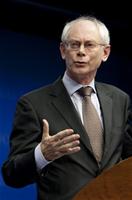 At the NATO summit were present all the “three faces” of the EU according to the Lisbon Treaty – the Council President Herman Van Rompuy, the High Representative for Foreign and Security Policy, Catherine Ashton, and the European Commission’s President Jose Manuel Barroso. This provoked a Turkish journalist to demand an explanation about EU’s presence at the NATO Council from NATO’s Secretary General.
At the NATO summit were present all the “three faces” of the EU according to the Lisbon Treaty – the Council President Herman Van Rompuy, the High Representative for Foreign and Security Policy, Catherine Ashton, and the European Commission’s President Jose Manuel Barroso. This provoked a Turkish journalist to demand an explanation about EU’s presence at the NATO Council from NATO’s Secretary General.
“The NATO-EU Summit did not take place because of the Turkish veto on Cyprus’s issue. Do you have a technical explanation why Mr Barroso and Ms Ashton are here? Is this not an attempt to go round the Turkish veto?”, the journalist asked. Anders Fogh Rasmussen calmly replied that there were no round-about attempts but that the EU representatives were invited by him to express their opinion because, he reminded, they do not have a right to vote in NATO Council.
In his lecture the Bulgarian Minister for Foreign Affairs explained that there were good ideas for a future cooperation between the EU and NATO – as for instance the idea EU Council President Herman Van Rompuy and NATO Secretary General Anders Fogh Rasmussen to develop a plan for current maximum cooperation. Recently, when security related decisions are discussed, there is a practice EU High Representative for Foreign Policy and Security Catherine Ashton to attend the meetings of NATO ministers and on his turn Pact’s Secretary General Rasmussen to attend the meetings of the EU Foreign Affairs Council, Minister Mladenov explained.
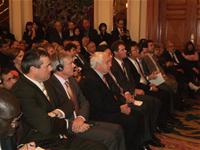 The important thing for Bulgaria is that it does no longer strive to join NATO but adequately participates in the organisation and formulates part of the Alliance’s priorities, Nickolay Mladenov underlined. And he wished: “In NATO, Bulgaria is a country that not only has demands but adds value. God help us to be able to say one day the same about our participation in the European Union!”
The important thing for Bulgaria is that it does no longer strive to join NATO but adequately participates in the organisation and formulates part of the Alliance’s priorities, Nickolay Mladenov underlined. And he wished: “In NATO, Bulgaria is a country that not only has demands but adds value. God help us to be able to say one day the same about our participation in the European Union!”
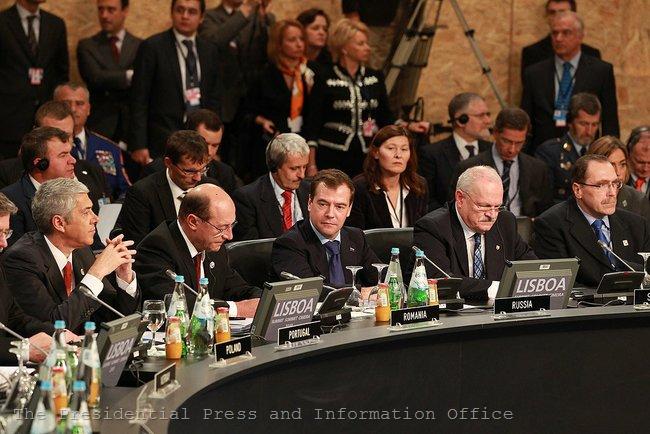 | © The Presidential Press and Information Office
| © The Presidential Press and Information Office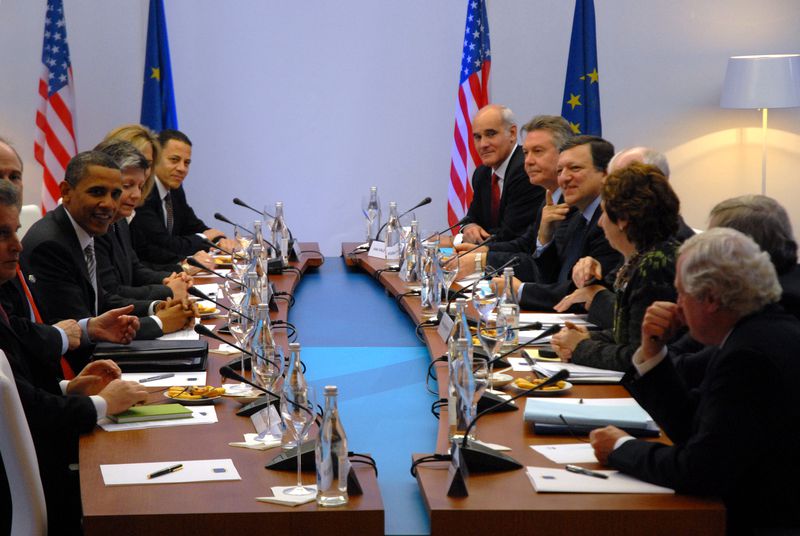 | © Audiovisual service
| © Audiovisual service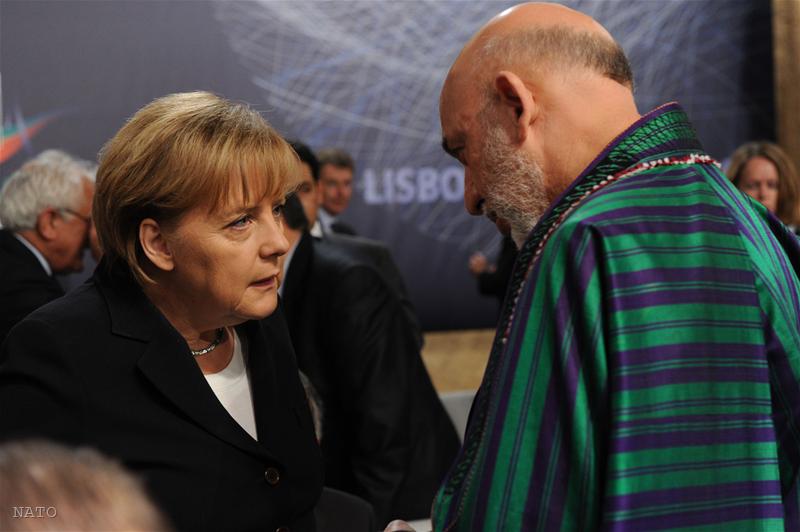 | © NATO
| © NATO